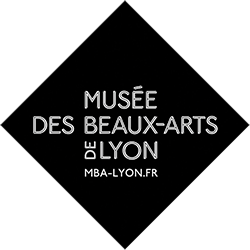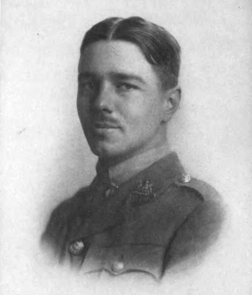Édités pour la première fois en 1920 à Londres, éditions Chatto & Windus
En écho à Robert Guinan Soldier’s Dream / Le Rêve du soldat, 1973
Wilfred Owen, Soldier’s Dream
I dreamed kind Jesus fouled the big-gun gears;
And caused a permanent stoppage in all bolts;
And buckled with a smile Mausers and Colts;
And rusted every bayonet with His tears.
And there were no more bombs, of ours or Theirs,
Not even an old flint-lock, nor even a pikel.
But God was vexed, and gave all power to Michael;
And when I woke he’d seen to our repairs.
En écho à Robert Guinan The Next War / La Prochaine guerre, 1973
Wilfred Owen, The Next War
“War’s a joke for me and you,
While we know such dreams are true.”
Siegfried Sassoon
Out there, we’ve walked quite friendly up to Death;
Sat down and eaten with him, cool and bland, –
Pardoned his spilling mess-tins in our hand.
We’ve sniffed the green thick odour of his breath, –
Our eyes wept, but our courage didn’t writhe.
He’s spat at us with bullets and he’s coughed
Shrapnel. We chorussed when he sang aloft;
We whistled while he shaved us with his scythe.
Oh, Death was never enemy of ours!
We laughed at him, we leagued with him, old chum.
No soldier’s paid to kick against his powers.
We laughed, knowing that better men would come,
And greater wars; when each proud fighter brags
He wars on Death, for lives; not men – for flags.
En écho à Robert Guinan, The Parable of the Old Man and the Young / La Parabole du Vieil homme et du Jeune, 1973
Wilfred Owen, The Parable of the Old Man and the Young
So Abram rose, and clave the wood, and went,
And took the fire with him, and a knife.
And as they sojourned both of them together,
Isaac the first-born spoke and said, My Father,
Behold the preparations, fire and iron,
But where the lamb for this burnt-offering?
Then Abram bound the youth with belts and straps,
And builded parapets and trenches there,
And stretched forth the knife to slay his son.
When lo! An angel called him out of heaven,
Saying, Lay not thy hand upon the lad,
Neither do anything to him. Behold,
A ram, caught in a thicket by its horns;
Offer the Ram of Pride instead of him.
But the old man would not so, but slew his son,
And half the seed of Europe, one by one.
En écho à Robert Guinan, À terre, 1973
Wilfred Owen, À terre (Being the philosophy of many soldiers)
Sit on the bed. I’m blind, and three parts shell.
Be careful; can’t shake hands now; never shall.
Both arms have mutinied against me, – brutes.
My fingers fidget like ten idle brats.
I tried to peg out soldierly, – no use!
One dies of war like any old disease.
This bandage feels like pennies on my eyes.
I have my medals? – Discs to make eyes close.
My glorious ribbons? – Ripped from my own back.
In scarlet shreds. (That’s for your poetry book.)
A short life and a merry one, my buck!
We used to say we’d hate to live dead-old, –
Yet now… I’d willingly be puffy, bald
And patriotic. Buffers catch from boys
At least the jokes hurled at them. I suppose
Little I’d ever teach a son, but hitting,
Shooting, war, hunting, all the arts of hurting.
Well, that’s what I learnt, – that, and making money.
Your fifty years ahead seem none too many?
Tell me how long I’ve got? God! For one year
To help myself to nothing more than air!
One Spring! Is one too good to spare, too long?
Spring wind would work its own way to my lung,
And grow me legs as quick as lilac-shoots.
My servant’s lamed, but listen how he shouts!
When I’m lugged out, he’ll still be good for that.
Here in this mummy-case, you know, I’ve thought
How well I might have swept his floors for ever.
I’d ask no nights off when the bustle’s over,
Enjoying so the dirt. Who’s prejudiced
Against a grimed hand when his own’s quite dust,
Less live than specks that in the sun-shafts turn,
Less warm than dust that mixes with arms’ tan?
Yes, or a muckman. Must I be his load?
O Life, Life, let me breathe, – a dug-out rat!
Not worse than ours the existences rats lead –
Nosing along at night down some safe rut,
They find a shell-proof home before they rot.
Dead men may envy living mites in cheese,
Or good germs even. Microbes have their joys,
And subdivide, and never come to death.
Certainly flowers have the easiest time on earth.
“I shall be one with nature, herb, and stone,”
Shelley would tell me. Shelley would be stunned:
The dullest Tommy hugs that fancy now.
“Pushing up daisies,” is their creed, you know.
To grain, then, go my fat, to buds my sap,
For all the usefulness there is in soap.
D’you think the Boche will ever stew man-soup?
Some day, no doubt, if…
Friend, be very sure
I shall be better off with plants that share
More peaceably the meadow and the shower.
Soft rains will touch me, – as they could touch once,
And nothing but the sun shall make me ware.
Your guns may crash around me. I’ll not hear;
Or, if I wince, I shall not know I wince.
Don’t take my soul’s poor comfort for your jest.
Soldiers may grow a soul when turned to fronds,
But here the thing’s best left at home with friends.
My soul’s a little grief, grappling your chest,
To climb your throat on sobs; easily chased
On other sighs and wiped by fresher winds.
Carry my crying spirit till it’s weaned
To do without what blood remained these wounds.
En écho à Robert Guinan, Asleep / Endormi, 1973
Wilfred Owen, Asleep
Under his helmet, up against his pack,
After the many days of work and waking,
Sleep took him by the brow and laid him back.
And in the happy no-time of his sleeping,
Death took him by the heart. There was a quaking
Of the aborted life within him leaping…
Then chest and sleepy arms once more fell slack.
And soon the slow, stray blood came creeping
From the intrusive lead, like ants on track.
Whether his deeper sleep lie shaded by the shaking
Of great wings, and the thoughts that hung the stars,
High pillowed on calm pillows of God’s making
Above these clouds, these rains, these sleets of lead,
And these winds’ scimitars;
- Or whether yet his thin and sodden head
Confuses more and more with the low mould,
His hair being one with the grey grass
And finished fields of autumns that are old…
Who knows? Who hopes? Who troubles? Let it pass!
He sleeps. He sleeps less tremulous, less cold
Than we who must awake, and waking, say Alas!
En écho à Robert Guinan, The Last Laugh / Le Dernier rire, 1973
Wilfred Owen, The Last Laugh
‘O Jesus Christ! I’m hit,’ he said; and died.
Whether he vainly cursed, or prayed indeed,
The Bullets chirped – In vain, vain, vain!
Machine-guns chuckled – Tut-tut! Tut-tut!
And the Big Gun guffawed.
Another sighed, – ‘O Mother, mother! Dad!’
Then smiled at nothing, childlike, being dead.
And the lofty Shrapnel-cloud
Leisurely gestured, – Fool!
And the falling splinters tittered.
‘My Love!’ one moaned. Love-languid seemed his mood,
Till, slowly lowered, his whole face kissed the mud.
And the Bayonets’ long teeth grinned;
Rabbles of Shells hooted and groaned;
And the Gas hissed.
En écho à Robert Guinan, He Died Smiling / Il est mort en souriant, 1973
Wilfred Owen, He Died Smiling
Patting goodbye, his father said, “My lad,
You’ll always show the Hun a brave man’s face.
I’d rather you were dead than in disgrace.
We’re proud to see you going, Jim, we’re glad”
His mother whimpered, “Jim, my boy, I frets
Until ye git a nice safe wound, I do.”
His sisters said: why couldn’t they go too.
His brothers said they’d send him cigarettes.
For their three years, once a week, they wrote the same,
Adding, “We hope you use the Y.M. Hut.”
And once a day came twenty Navy Cut.
And once an hour a bullet missed its aim.
And misses teased the hunger of his brain.
His eyes grew scorched with wincing, and his hand
Reckless with ague. Courage leaked, like sand
From sandbags that have stood three years of rain.







